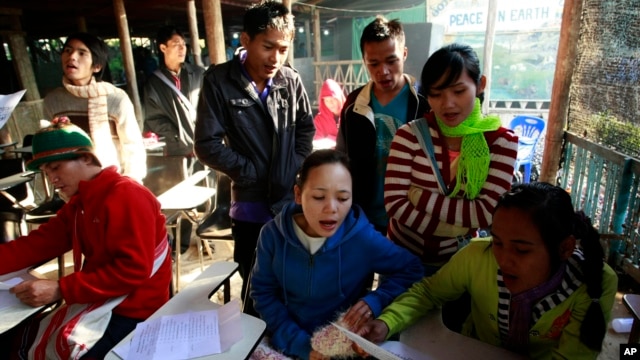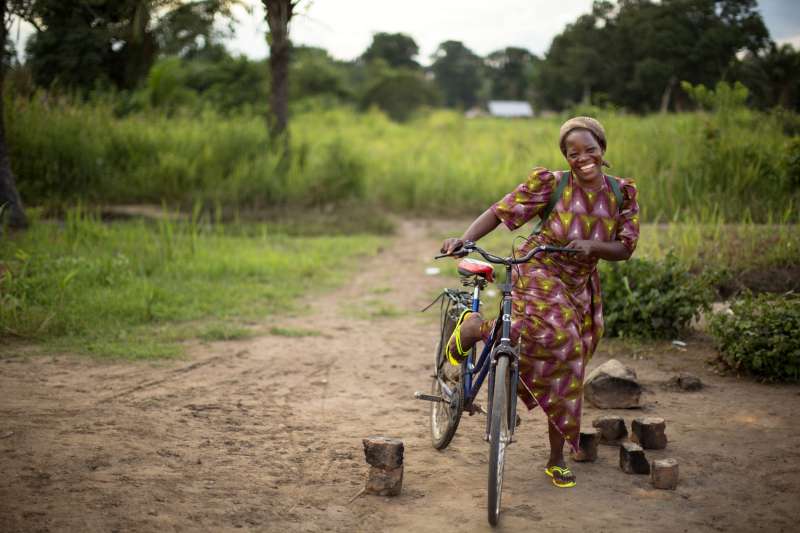Roughing it out: Many refugees welcome the government’s proposal to allow them to work legally while they await resettlement to a third country or voluntary repatriation. Seen here are Myanmar refugees Htet Thiri (left), 25, and Than Than, 42, who are eagerly awaiting that day.
Plans are underway for the Home Affairs Ministry to make work legal for refugees and asylum seekers in Malaysia.
THE job could not be better – apart from the good wage, food, accommodation and transport are provided. With jobs hard to come by for refugees, Somali refugee Ahmed* and friends were grateful.
Come payday, however, their “dream job” became a nightmare. Instead of getting paid, Ahmed and friends were slapped with a bill for their food and accommodation.
“He told us we had to pay him because we owed him money for the food, accommodation and other expenses,” says the 28-year-old who fled to Malaysia two years ago.
When they protested, they were threatened with beatings and even deportation to Somalia.
Forced to work illicitly, refugees in Malaysia are at risk of exploitation and victimisation by some unscrupulous employers.
Hence, many welcome the government’s proposal to allow them to work legally while they await resettlement to a third country or voluntary repatriation.
Currently, some 104,070 refugees here are registered with the United Nations High Commission for Refugees (UNHCR) while some 50,000 are waiting to be registered. To survive, they take up informal and odd jobs.
Formalising work for refugees will give them a legal recourse if they get caught in any exploitative situations with employers, says S. Sharif Mohamed, the leader of a Somali refugee community in Kuala Lumpur.
“For example, those like Ahmed will be able to go to the police if they are not paid or are ill-treated by employers. Knowing that refugees are protected, meanwhile, will make employers think twice before exploiting them,” he adds.
At the same time, it will encourage more employers to hire refugees, Sharif highlights.
“Some employers now are reluctant to hire refugees because they are afraid of getting into trouble with the authorities,” he says.
As reported, the Home Affairs Ministry is working with the Immigration Department and UNHCR to devise plans on providing training and jobs for them.
This includes implementing a proper recruitment and monitoring system to ensure that the refugees are not exploited or trafficked in any way.
The right mechanism
For many employers, however, their worry about hiring refugees and asylum seekers is the lack of proper legal and administrative framework governing them in Malaysia.
But according to UNHCR representative in Malaysia Michele Manca di Nissa, there are already systems in place for refugee documentation, protection and assistance in the country.
“UNHCR has already established good cooperation with the Malaysian Government with some ad hoc arrangements for refugee protection and assistance.
“For instance, the UNHCR documentation is increasingly being recognised by law enforcement officials and UNHCR is able to intervene for the release of refugees should they be held for immigration offences,” he clarifies.
On the worry of refugee workers running away or leaving, Manca di Nissa draws attention to the main reason why they fled their home countries.
“Refugees and asylum-seekers fled their countries because of conflict and widespread human rights abuses. It was not a choice.
“Unlike economic migrants, refugees do not enjoy the protection of their home countries and cannot return home or be deported. They fear being deported back where their lives and freedom are at risk. They would not jeopardise the safety they enjoy in Malaysia.”
Manca di Nissa sees the proposal as a practical and pragmatic way of responding to the refugee situation in Malaysia.
“This is a move that will help the refugee population here. It is a humanitarian solution to a humanitarian problem, which we welcome. It takes account of social realities on the ground, which are better tackled than ignored,” he stresses.
It makes a lot of sense to use the existing refugee population to fill the labour needs of the country, he adds.
“Refugees have skills and are able to contribute to the society in which they live. Here, they are readily available as a source of labour while there is a need for foreign labour.”
Crucially, Manca di Nissa believes the scheme can be implemented easily, without reviewing the labour management framework or drawing up new labour policies.
“There is no need to create parallel systems. One practical approach could be to integrate refugees within this same foreign labour system.
“If refugees are able to access work legally, then just as any other legal migrant in the country, they would enjoy the same basic work rights and workplace protection as any other migrant, thus addressing issues such as minimum wage, work hours, workplace safety, and exploitation by employers.”
For some, this is the crunch. With the problems currently afflicting the foreign labour here, there is a danger of putting the already vulnerable community in a more vulnerable position.
The Malaysian Bar, for one, is of the view that a proper system is needed to ensure that refugees and asylum seekers are accorded the basic labour rights of a decent wage, fair working hours, off-days, medical benefits and workplace health and safety protection – something that many migrant workers here do not receive despite the laws and policies in place.
“They are also at risk of harassment, extortion and ill-treatment by enforcement officers and members of the public during their travel to and from work, and even in their place of residence. They are living in a climate of fear and insecurity,” states Malaysian Bar president Christopher Leong.
Tenaganita executive director Dr Irene Fernandez agrees, “If we don’t put in the proper mechanism, we will be creating another group to be exploited by unscrupulous employers.”
Syarif implores employers not to use the opportunity of hiring refugees to cut production costs.
“We hope people can remember that refugees also need to eat, pay rent and use transportation, so they need enough pay. At least they should get minimum wage like other workers.
“Anyway, it will create another problem (if refugees are paid less) because it might take jobs away from locals,” he says.
Ultimately, says Syarif, legalising work for the refugees will help them help themselves.
“We now have to rely on others for help. If we are allowed to work formally, we will be able to stand on our own two feet.”
For the Somali refugee community that is made up of 90% widowed or abandoned women, it will be a huge relief.
“Right now, I take any job that I can to survive with my young son here. But it puts me at the mercy of my boss. If he doesn’t pay me for working extra hours, I cannot say no,” shares 53-year-old Amina Hassan who fled to Malaysia three years ago after her husband disappeared in the civil war.
If they are officially allowed to work, she adds, she can get a better job at restaurants or hotels and stop begging for money from her relatives all the time.
Another group in the 1,100 over Somali community is young girls who have been sent away by their families to prevent them from being war rape victims.
Mayaa Abdiqadir, 16, and Fatima Mahamed, 18, say it will help them when they are resettled in the third country in the future.
“It will be easier for us to get work or continue our studies there if we have some sort of work training and experience,” says Fatima, who dreams of becoming a teacher one day.
It is important to remember that refugees do not wish to be a burden to their home country, Manca di Nissa reiterates.
While Malaysia has extended its generous hospitality in allowing refugees to remain in the country, the current restriction on employment makes it difficult for them to fend for themselves, while putting them in an insecure situation daily. Hence, granting legal access to work for refugees should be a priority.
Finding the right fit
Interestingly, many Malaysian employers are in support of the move to allow refugees to work.
Cyber entrepreneur J. Choy is willing to hire refugees for a variety of jobs, depending on their skills.
“They too need work to survive. I hear there are many jobless Middle Eastern refugees stuck in Malaysia who are highly educated and skilled.”
Malaysian Employers Federation (MEF) executive director Shamsuddin Bardan agrees that it will be a waste of available human resource not to allow refugees to work.
“The move to train and allow refugees to work is good for the employers, especially in light of the anticipated gap left by illegal foreign workers when the Home Affairs Ministry step up enforcement to weed out illegal foreign workers.”
Under the Human Resource Ministry, foreign workers are allowed to work in the manufacturing, construction, plantation, service and domestic help sectors.
Opening the employment in these sectors, as well as those not attractive to locals, will help address any labour shortage problems.
“Currently, many Myanmar refugees are employed in the retail trade (hypermarket, supermarket, wet market) and they seem to be able to adapt well to the requirements of the job. Further training will make them more adaptable,” says Shamsuddin.
Dr Fernandez, however, raises the importance of giving refugees job choices.
“While it is important for us to recognise the rights of refugees to have the right to work, they must be given the choice to work wherever they want and not to define any sector of employment,” she stresses.
This is something that Mohammad Sadek, programme coordinator for the Rohingya Arakanese Refugee Committee (RARC), believes in strongly,
“There are many refugees with trained skills and high qualifications. They should be allowed to work in areas they are interested or capable in.”
Manca di Nissa agrees.
“Our interest is in supporting Malaysia’s own needs while ensuring that these are sectors where refugees are able to contribute and we hope that it will also take advantage of the skills refugees have to offer. UNHCR welcomes further dialogue with the Malaysian Government on specific sectors as a start, and this can be reviewed at a later date,” he says.
Crucially, having job opportunities will not lead them to abuse Malaysia’s hospitality, says Sharif.
“We are thankful to the Malaysian Government and the people to let us stay here in peace but we don’t want to stay here forever. We wish we could go home one day but for now, we hope the UNHCR will still help us get resettled to another country,” he says.
As Shamsuddin puts it, not working will cause various social and economic issues, not only for refugees but also to society at large.
“Normally, refugees need to be at the host country for a long period as the process to be accepted by a third country or to go back to the home country will take some time to be finalised.”
In this regard, it is crucial that the Government put in a more comprehensive legal and administrative framework for dealing with refugees and asylum seekers in a more holistic and humane manner, argues Leong.
“Allowing them to work is a positive step in the right direction, but we also need to look at their other rights such as health and education for their children. Our laws are not properly geared to accord them due recognition, care and protection,” he says, stressing that it is high time Malaysia ratifies the 1951 Refugee Convention and the 1967 Protocol relating to the status of Refugees.
To Sharif, it is simple.
“Ultimately, it is a question of survival for us refugees,” he says.





















